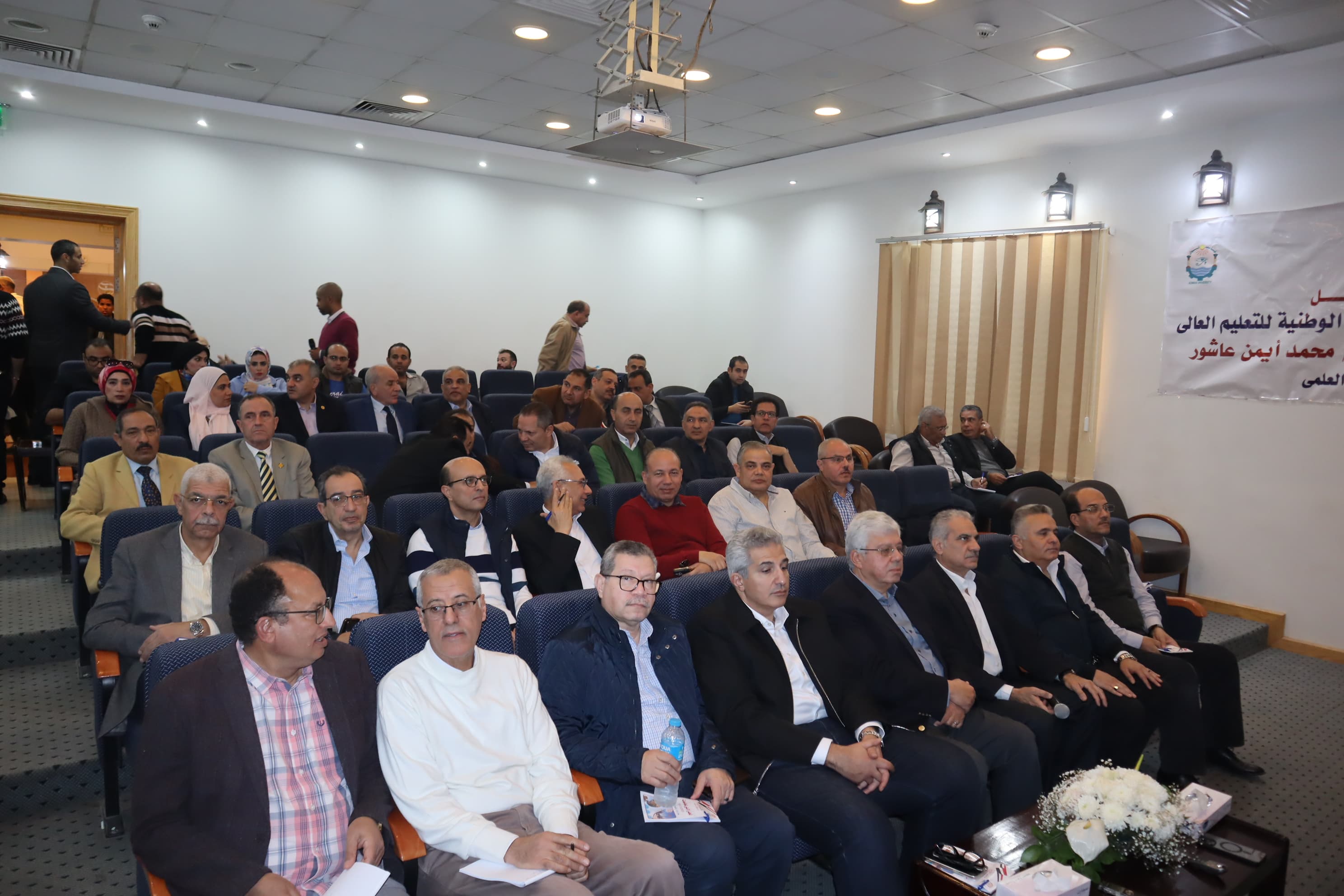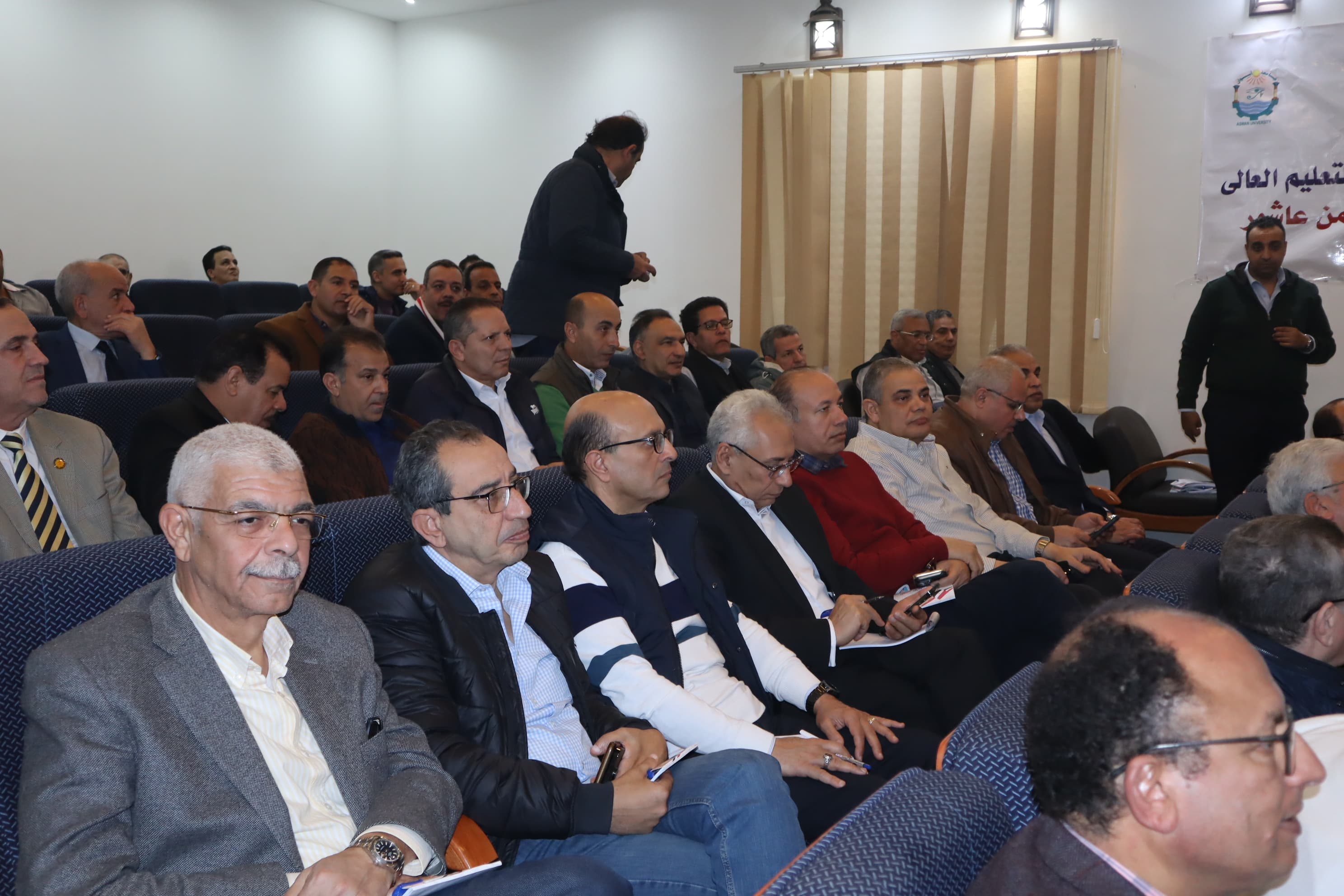- prof. El-Minshawy appreciates the vision of the Ministry of Higher Education and the remarkable progress in the system and linking it to the developmental needs of the community
Prof. Ahmed El-Minshawy, president of Assiut University, witnessed the activities of the workshop held entitled: "Accessibility in Education in the Light of the National Strategy for Higher Education and Scientific Research" in the presence of Dr. Ayman Ashour, Minister of Higher Education and Scientific research, the secretaries of the Supreme Council of universities, the Council of private universities, the Council of private universities, the Council of technological universities, the Supreme Council for Institute Affairs, several university presidents and ministry leaders.
Prof. El-Minshawy praised the vision of the Ministry of Higher Education in developing and modernizing the system, linking the gains of education and scientific research with the developmental needs of society, praising the theme of the workshop, and its importance in emphasizing the integration of the concept of accessibility with the quality of education, among the objectives of the national strategy for education and scientific research, based on the vision of the state 2030 and the Sustainable Development Goals, focusing on the needs of the labor market, the development of study programs, linking them with the developmental needs and industry, encourages scientific research, innovation and diversifying sources of funding.
A statement issued by the Ministry of Higher Education stated that Dr. Ayman Ashour confirmed that the higher education system is witnessing a significant expansion thanks to the support provided by the political leadership to accommodate the growing demand for university education, pointing out that population growth requires expansion in the establishment of various universities, pointing to the importance of providing universities with modern inter-study programs that keep pace with the requirements of the local, regional and international labor market, as well as contributing to attracting students to enroll in universities, and training students in practice in cooperation with various companies to qualify students to be eligible to join the labor market, to refine students ' experiences and develop their abilities and skills, and in line with achieving the objectives of the national strategy for higher education and scientific research and Egypt's Vision 2030.
The minister explained that the higher education system is characterized by diversity, as it includes government universities, private universities, technological universities, branches of international universities, universities with international agreements and framework and special laws, in addition to institutes, pointing out that this diversity helps to upgrade the system of higher education and scientific research.
Dr. Ayman Ashour pointed out the importance of continuing partnerships with prestigious international universities to achieve the maximum possible benefit for the development of the educational and research system in Egypt, and to provide distinguished dual-degree study programs, in cooperation with major prestigious universities, as well as attracting international students to study at Egyptian universities, support the implementation of Applied Scientific Research, co-financing research, as well as cooperation and integration with various academic, research and industrial institutions.
Dr. Mustafa Refaat, Secretary of the Supreme Council of universities, pointed out that there is an increasing demand from students to enroll in modern specialties and study programs that meet the needs of future jobs, pointing out that work is being done to develop study programs at various colleges in line with the objectives of the national strategy for higher education and scientific research and achieving the Sustainable Development Goals, explaining the importance of integration between universities and productive and industrial institutions to raise the level of graduates to be qualified to compete in the labor market.
Dr. Mostafa Refaat pointed to the efforts of the Egyptian state during the past period in terms of expanding access and developing the infrastructure of higher education institutions, and updating study programs to suit the contemporary and future labor market.
Dr. Cyril Clark, executive vice president and academic director of Virginia Tech University of America, made a presentation about the University's vision of cross-border cooperation, access to education, university admission mechanisms, scholarship systems, pointing out that the university offers many study programs, grants Bachelor's, graduate and professional degrees, and enjoys the presence of highly qualified faculty members, reviewing the most prominent challenges overcome by Virginia Tech University of America.
Dr. Cyril Clark presented the mechanisms and efforts of the university to link study programs with the industrial community; to achieve integration, cooperation and homogeneity between the academic community and the industrial community, explaining the University's interest in the cross-border education system, maximizing the promotion of learning and discovery between different disciplines, as well as attention to creating an educational environment stimulating creativity, innovation and excellence, qualifying students well through the development of modern study programs, and providing students with modern science and technology; to be able to meet the needs of the international labor market, expressing his aspiration to enhance cooperation with Egyptian universities and exchange experiences; to achieve the maximum possible benefit.
Dr. Adel Abdel Ghaffar, media advisor and official spokesman of the ministry, stated that the workshop witnessed the opening of the discussion between university presidents and higher education leaders, and these discussions resulted in providing positive, fruitful and supportive ideas for the development of the educational and research system in Egypt in the future at the level of developing practical skills for university students in accordance with the needs of the labor market.
The spokesperson added that the workshop reviewed the efforts of universities in the accessibility file, in light of the principles of the national strategy of the Ministry of higher education and scientific research, which is based on 7 main principles, namely (integration, overlapping disciplines, communication, effective participation, sustainability, international reference, entrepreneurship and innovation), and also agreed on the importance of linking education to the actual needs of society.

 Do you have any questions?
Do you have any questions? 





